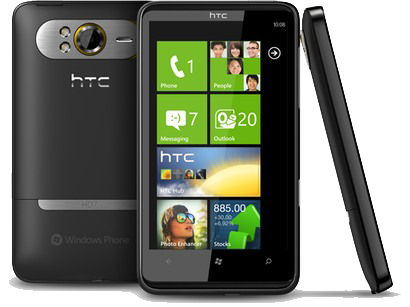HTC HD7 Windows Phone 7 Smartphone: Review

A useful and well-executed device, but will it fly off the shelves?
Bing and Zune
Microsoft’s massive investment in initiatives such as Bing pays off in Windows Phone 7. The phone’s Maps app looks spectacular, shifting to a satellite view as you zoom closer to the ground. However, this element also comes with some kinks: I kept trying to navigate from Manhattan to Queens, for example, only to have the app’s Directions feature repeatedly try to direct me to Long Island. Eventually, I had to activate Internet Explorer and use Google Maps. Other addresses proved less of a problem.
In a development that will shock exactly nobody, Bing is also Windows Phone 7’s default search engine. One of the smartphone’s better features is voice search, which seems responsive and relatively accurate. For example, when I told the device, “Chinese restaurant” while standing on a busy street in Midtown Manhattan during New Year’s Eve, it heard me accurately; a few seconds later, I had a list of nearby eateries serving highly questionable egg rolls. Specific place names take a little work, requiring you to clearly enunciate clearly and loudly into the device, but ultimately work as intended.
Likewise, Zune is a very pretty piece of software for navigating through one’s music collection. It earned high marks from critics when installed on Microsoft’s Zune HD device, and the company wisely made few changes when porting it over to the Windows Phone 7 platform. But at least for the time being, Zune’s lack of recognition could harm it with those used to iTunes or other applications.
Setup is easy
It took me about five minutes to set up the phone with my Gmail, Outlook, Twitter (which requires an individual app download), Windows Live and Facebook accounts. Windows Phone 7 also ported over my calendar appointments without a hiccup. The “Metro” theme, familiar to those who’ve used the Zune HD, offers intuitive navigation and a handsome interface.
A seamless Office hub
Windows Phone 7’s most seamless feature, at least in this reviewer’s opinion, is the “Office” Hub, which allows workers on-the-go to perform light edits on Word documents, Excel worksheets and PowerPoint presentations. Those items ported from my 15-inch laptop to the smartphone, via e-mail, with nary a glitch or a flub in spacing or formatting.
All elements seemed right-sized on a 4.3-inch screen, and simple functions — such as italicising — came off without those frustrating bugs that often grip first-generation software (the WP7 keyboard is also well-executed, even for big fingers like mine). Saving and porting those documents to email was likewise a snap. For business users, Windows Phone 7 also offers integrated SharePoint.
Microsoft’s apps marketplace now features some 5,000 applications for Windows Phone 7, according to reports, and this presents a fine collection for those wanting to download a few games and productivity applications. It doesn’t even come close to the size of Apple’s and Google’s respective app bazaars, of course, but those platforms also boast their share of substandard programs; although my delving into Microsoft’s apps wasn’t extensive, it seemed after a few days that the bulk of the apps on offer were of suitably high quality.
Once downloaded, apps install onto a secondary Windows Phone 7 screen, one swipe away from the “main” Start screen. From there, you can press down on a particular app to pin it to the Start screen. This is fine if you’re only interested in having, say, Facebook and a few games a tap or two away. Power app users, though, may soon find themselves wishing for some sort of organizing principle—along the lines of Apple’s iOS apps folders—for ordering the apps they’ll doubtlessly want to place on the Start screen.
Conclusion
In what will likely prove a disappointment to those critics who like to proclaim Microsoft dead in the consumer space, Windows Phone 7 boasts no major issues. Despite the overall polish and functionality, though, the platform still feels like a first draft — one far more polished than the Android 1.6 that ran on the original Motorola Droid, for example, but nonetheless lacking some key features such as cut-and-paste. Reports suggest a software update in the works for January, followed by another in later 2011, so hopefully some of the early kinks will be ironed out.
But for the prospective smartphone buyer, there’s also little here to recommend Windows Phone 7 over the Apple iPhone or a similar Google Android device, unless they have a deep-seated desire for either Xbox Live or SharePoint integration. The Hubs’ focus on making functions streamlined and intuitive is likewise useful and well-executed, but maybe not enough to make phones fly off the shelves.
Microsoft has kicked off a smartphone initiative which will, in a few quarters, put it on similar hardware and software footing to its rivals in the space; what it needs now is a competitive differentiator that will allow it to stand out.